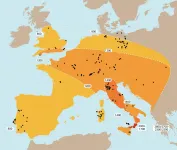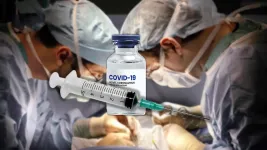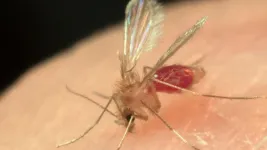Transforming atmospheric carbon into industrially useful materials
Salk scientists quantify process to permanently store plant-captured CO2 as SiC, a valuable material for electronics
2021-05-06
(Press-News.org) LA JOLLA--(May 6, 2021) Plants are unparalleled in their ability to capture CO2 from the air, but this benefit is temporary, as leftover crops release carbon back into the atmosphere, mostly through decomposition. Researchers have proposed a more permanent, and even useful, fate for this captured carbon by turning plants into a valuable industrial material called silicon carbide (SiC)--offering a strategy to turn an atmospheric greenhouse gas into an economically and industrially valuable material.
In a new study, published in the journal RSC Advances on April 27, 2021, scientists at the Salk Institute transformed tobacco and corn husks into SiC and quantified the process with more detail than ever before. These findings are crucial to helping researchers, such as members of Salk's Harnessing Plants Initiative, evaluate and quantify carbon-sequestration strategies to potentially mitigate climate change as CO2 levels continue to rise to unprecedented levels.
"The study offers a very careful accounting for how you make this valuable substance and how many atoms of carbon you've pulled out of the atmosphere. And with that number, you can start to extrapolate what role plants could play in mitigating greenhouse gases while also converting an industrial byproduct, CO2, into valuable materials by using natural systems like photosynthesis," says co-corresponding author and Salk Professor Joseph Noel.
SiC, also known as carborundum, is an ultrahard material used in ceramics, sandpaper, semiconductors and LEDs. The Salk team used a previously reported method to transform plant material into SiC in three stages by counting carbons at each step: First, the researchers grew tobacco, chosen for its short growing season, from seed. They then froze and ground the harvested plants into a powder and treated it with several chemicals including a silicon-containing compound. In the third and final stage, the powdered plants were petrified (turned into a stony substance) to make SiC, a process that involves heating the material up to 1600 ?C.
"The rewarding part was that we were able to demonstrate how much carbon can be sequestered from agricultural waste products like corn husks while producing a valuable, green material typically produced from fossil fuels," says first author Suzanne Thomas, a Salk staff researcher.
Through elemental analysis of the plant powders, the authors measured a 50,000-fold increase in sequestered carbon from seed to lab-grown plant, demonstrating plants' efficiency at pulling down atmospheric carbon. Upon heating to high temperatures for petrification, the plant material loses some carbon as a variety of decomposition products but ultimately retains about 14 percent of the plant-captured carbon.
The researchers calculated that the process to make 1.8 g of SiC required about 177 kW/h of energy, with the majority of that energy (70 percent) being used for the furnace in the petrification step. The authors note that current manufacturing processes for SiC carry comparable energy costs. So while the production energy required means that the plant-to-SiC process isn't carbon neutral, the team suggests that new technologies created by renewable energy companies could bring down energy costs.
"This is a step towards making SiC in an environmentally responsible approach," says co-corresponding author and Salk visiting scientist James La Clair.
Next, the team hopes to explore this process with a wider variety of plants, in particular plants like horsetail or bamboo, that naturally contain large amounts of silicon.
INFORMATION:
About the Salk Institute for Biological Studies:
Every cure has a starting point. The Salk Institute embodies Jonas Salk's mission to dare to make dreams into reality. Its internationally renowned and award-winning scientists explore the very foundations of life, seeking new understandings in neuroscience, genetics, immunology, plant biology and more. The Institute is an independent nonprofit organization and architectural landmark: small by choice, intimate by nature and fearless in the face of any challenge. Be it cancer or Alzheimer's, aging or diabetes, Salk is where cures begin. Learn more at: salk.edu.
ELSE PRESS RELEASES FROM THIS DATE:
2021-05-06
ITHACA, N.Y. - By swiping surfaces in commercial food processing plants with specially designed rapid-testing adenosine triphospate (ATP) swabs - which produce a light similar to the glow of fireflies in the presence of microorganisms - spoilage and foodborne illness could diminish, according to a new study from Cornell University food scientists.
During food production, routine cleaning and surface sanitation are keys to help prevent microbial contamination in the end food products. Without such a sanitation regime, food from processing plants can become more vulnerable ...
2021-05-06
PHILADELPHIA-- When evaluating the opioid crisis, research reveals that external factors - such as the volume of pre-filled syringes, or a default number of opioid tablets that could easily be ordered at discharge for the patient - can shift prescribing and compel emergency department (ED) physicians to administer or prescribe greater quantities of opioids. A new study published in the Journal of Medical Toxicology reveals that opioid prescribing behavior can also be decreased by external factors, such as a supply shortage.
Led by the Perelman School of Medicine at the University of Pennsylvania, researchers evaluated pharmacy data from the electronic medical records (EMR) collected before, during, and after a period of parenteral ...
2021-05-06
BOSTON - New research led by a team at Massachusetts General Hospital (MGH) points to a promising strategy to boost tumors' intake of cancer drugs, thereby increasing the effectiveness of chemotherapy treatments. The group's findings are published in Nature Nanotechnology.
Getting enough anticancer drugs into a tumor is often difficult, and a potential strategy to overcome this challenge involves binding the medications to albumin, the most abundant protein in blood. The strategy relies on tumors' large appetite for protein nutrients that fuel malignant growth. When consuming available albumin, the tumors will inadvertently take in the attached drugs.
A popular albumin-bound drug approved by the U.S. Food and Drug Administration is ...
2021-05-06
How did people living in the Bronze Age manage their finances before money became widespread? Researchers from the Universities of Göttingen and Rome have discovered that bronze scrap found in hoards in Europe circulated as a currency. These pieces of scrap - which might include swords, axes, and jewellery broken into pieces - were used as cash in the late Bronze Age (1350-800 BC), and in fact complied with a weight system used across Europe. This research suggests that something very similar to our 'global market' evolved across Western Eurasia from the everyday use of scrap for cash by ordinary people some 1000 years before the beginning of classical civilizations. The results were published in Journal of Archaeological Science.
This study analysed around ...
2021-05-06
'Natural disasters,' sparked by climate change and other natural hazards, increase the triggers for violence against women and girls by boosting the means, opportunity, and underlying drivers, finds a review of the available evidence, published in the online journal BMJ Global Health.
As these disasters are increasing in frequency, severity, and duration worldwide, this consequence must now be formally recognised in public health, violence prevention, and disaster management strategies, urge the researchers.
Over the past two decades, 7348 ...
2021-05-06
New research from Simon Fraser University suggests that students learning remotely become night owls but do not sleep more despite the time saved commuting, working or attending social events.
The study, led by psychology professor Ralph Mistlberger, Andrea Smit and Myriam Juda, at SFU's Circadian Rhythms and Sleep Lab, compared self-reported data on sleep habits from 80 students enrolled in a 2020 summer session course at SFU with data collected from 450 students enrolled in the same course during previous summer semesters. The study results were recently published in the journal PLOS ONE.
"There is a widespread belief among ...
2021-05-06
In a study published today in the Journal of the American Medical Association (JAMA), Johns Hopkins Medicine researchers show that although two doses of a vaccine against SARS-CoV-2 -- the virus that causes COVID 19 -- confers some protection for people who have received solid organ transplants, it's still not enough to enable them to dispense with masks, physical distancing and other safety measures.
This is a follow-up study to an earlier one published in March in JAMA, in which the researchers reported that only 17% of the participating transplant recipients produced sufficient antibodies after just one dose of a two-dose COVID-19 vaccine regimen.
"While there was an ...
2021-05-06
Loneliness and social isolation have been significant problems for the general population during the COVID-19 pandemic, but for cancer patients these issues were particularly acute, likely due to isolation and social distancing, according to a new UCSF study.
The study, which is the first to evaluate loneliness, anxiety, depression, fatigue and other symptoms in a single group of patients, is published in Cancer, a peer-reviewed journal of the American Cancer Society.
"We found that oncology patients were experiencing a deep sense of loneliness," ...
2021-05-06
Researchers at North Carolina State University and the University of North Carolina Greensboro made a surprising finding while examining areas where sand flies rear their young: a new species of bacteria that is highly attractive to pregnant, or gravid, sand flies. The findings could advance the production of ecologically safe baits or traps to reduce sand fly populations.
Sand flies are vectors for important parasitic diseases affecting people in tropical and subtropical regions in Asia, Africa and the Middle East. One of those diseases is Leishmaniasis, which generally causes ...
2021-05-06
HOUSTON - (May 6, 2021) - A Rice University laboratory has adapted its laser-induced graphene technique to make high-resolution, micron-scale patterns of the conductive material for consumer electronics and other applications.
Laser-induced graphene (LIG), introduced in 2014 by Rice chemist James Tour, involves burning away everything that isn't carbon from polymers or other materials, leaving the carbon atoms to reconfigure themselves into films of characteristic hexagonal graphene.
The process employs a commercial laser that "writes" graphene patterns into surfaces that to date have included wood, paper and even food.
The new iteration writes fine patterns of graphene into photoresist polymers, light-sensitive materials used in photolithography and ...
LAST 30 PRESS RELEASES:
[Press-News.org] Transforming atmospheric carbon into industrially useful materials
Salk scientists quantify process to permanently store plant-captured CO2 as SiC, a valuable material for electronics



